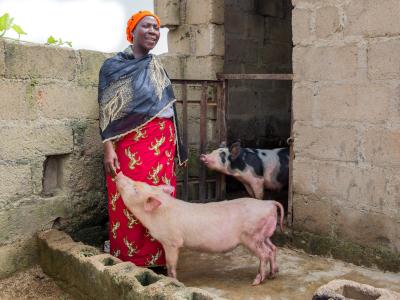These and other questions on women’s contributions to peace-building and stability were put to U.S. Ambassador to the United Nations, Samantha Power, by Glamour magazine Editor-in-Chief Cindi Leive at our Annual Luncheon on May 6th in New York City.
With recent events in Nigeria, South Sudan, Syria, and elsewhere threatening the lives of women and girls, Ambassador Power shared her experience witnessing the terrible human toll of conflict during her time as a journalist and her conviction that such atrocities can be stopped.
Ambassador Power shared key actions that will improve outcomes and increase the potential for women to become empowered in their communities.
Tackle the Culture of Impunity
Around the world, 1 in 3 women experience violence during their lifetime, but very few perpetrators are ever punished, feeding a cycle of impunity for such crimes. Discussing the mass kidnapping of nearly 300 young women and girls in Nigeria, Ambassador Power stressed the importance of ending such impunity, reminding all that “...the UN has made it clear: anybody who sells or purchases girls will be held accountable.” Such accountability is critical, particularly when corruption, human rights abuses, and weak institutions create an unstable environment that extremist groups can exploit.
Legal Enforcement Demonstrates Culture of Zero Tolerance for Gender-Based Violence
After the Bosnian War and the Genocide in Rwanda, many courageous women were key to pushing international criminal tribunals to recognize rape and sexual and gender-based violence as crimes against humanity and genocide, and to hold the perpetrators to account. With this step forward, the next great challenge is to make justice accessible for every woman, in every community. In places like Nigeria, Women for Women International has helped women learn their rights and understand how the legal system can help them access rights related to property, inheritance, child custody, and others.
Champion Access to Education to Strengthen Communities and Generate Economic Prosperity
From northeast Nigeria to Syrian refugee camps, improving equal access to education for girls and boys is not just an investment to create opportunities and strengthen the next generation. Ambassador Power underscored it as one of the best ways to foster lasting stability, reduce the hold of extremist groups, and prevent conflict.
Around the world, there are 65 million girls and female adolescents out of school, who do not have the opportunity to develop their potential, escape cycles of poverty, and gain knowledge, skills, and confidence to become leaders. In Women for Women International’s work, we know that children’s access to education often improves when women’s incomes rise: two years after finishing our program, women say that nearly 90% of their children are in school, compared to just over 50% before.
Foster Leadership Roles for Women Translates Into Stabilizing Domestic Policy and Investments
It’s not a secret that when women are in leadership roles, they often focus on issues such as healthcare, schools, and children’s well-being, all of which strengthen communities. Evidence can be found in the rebuilding efforts after the brutal Rwandan Genocide. Not only did women made up a majority of the population, there was a priority placed on developing women’s potential and leadership as an intentional part of the country’s recovery. Today, women make up nearly 2 out of every 3 parliamentarians – the highest rate in the world.
Celebrating Women Peacemakers
As women take on greater leadership roles in their countries and communities, there has been a greater push to include women in peace processes and peace-building efforts. Ambassador Power cited the work of women like Catherine Samba-Panza in the Central African Republic who push for reconciliation and other investments that unite communities to bring about an end to violence. At Women for Women International, our programs bring together diverse groups of women to build connections across ethnic, sectarian, and religious divides to reduce tensions and work toward common goals to help communities move forward.
Women for Women International Making a Difference
Throughout the program, Ambassador Power underscored the important work of Women for Women International. As she shared stories and offered reflections, she expressed gratitude for the work and courage of the global staff who work in some of the world’s most conflict challenged environment


